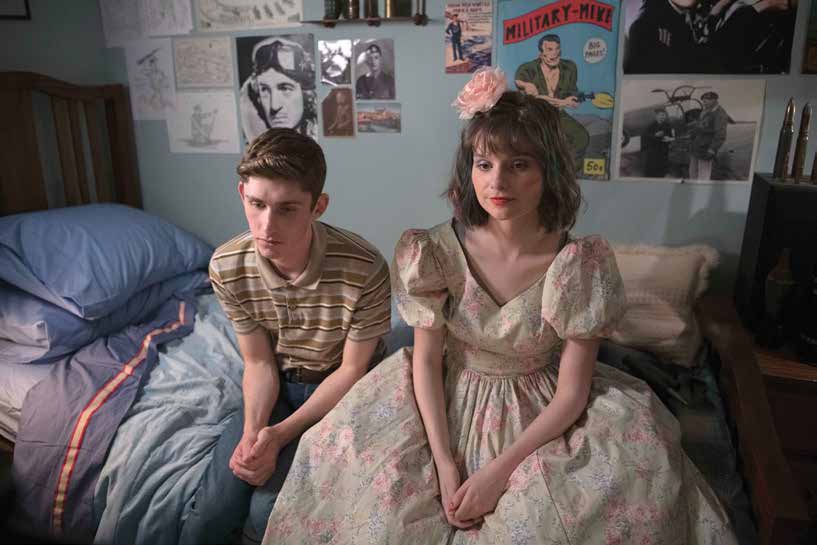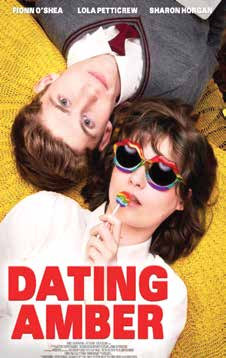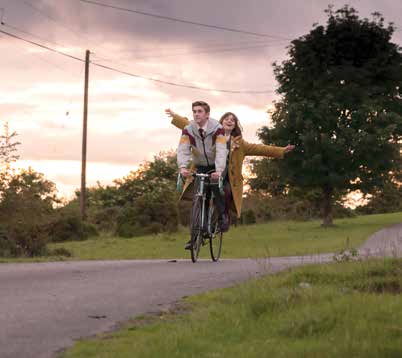
By Gary Kramer–
Out gaywriter/director David Freyne’s charming sophomore feature Dating Amber, now available on demand, is, the filmmaker said in a recent Zoom interview, “as autobiographical as I’m going to get.”
He explained, “I wanted to make a film of my experiences of struggling with sexuality and coming out. Amber is a very pretentious teenager, funny and acerbic, and Eddie is sweet and kind. Eddie is so me, and Amber is the me I wanted to be. I would have liked the things she liked but didn’t have the confidence. I didn’t want Amber to be a manic pixie dream girl; she had her own dreams. It’s very much a two hander and about both of them.”
His comedy, set in County Kildare, Ireland, in 1995, has Eddie (Fionn O’Shea from Handsome Devil) faking dating Amber (Lola Petticrew) because both are presumed to be queer by their classmates. They are both gay, of course, but it is not exactly easy for either of them to be out.

Eddie agrees to the ruse because he is determined to suppress his same-sex desires. He is training for the army, in part, because his father (Barry Ward) is in the military. He is also bullied and shamed by his classmates when he resists touching the breasts of Tracey (Emma Willis), a student he kisses under duress.
Freyne punctures masculine egos throughout Dating Amber because, he indicated, “We still live in hyper masculine world. Back then, it was such a lad culture. It felt incredibly suffocating to be around that, and not just for young gay men. I wanted to show how damaging that culture was for Eddie’s dad, who doesn’t know how to express himself because of that toxic masculine culture. I think masculinity is inherently funny and trying to be ‘manly’ and ‘male’—it’s such bs. Being macho is a joke, and really macho lads hate being made fun of.”
The filmmaker concluded wistfully, “I was such a repressed teen, and I tried to be manly, but how much of that is me, and how much is a hangover of that act? Had I grown up in a far more open society, would I be more camp now? When you spent 20 years so repressed, you can’t strip all that away from your behavior.”

As Dating Amber shows, the scrawny Eddie’s efforts to act manly only increase his internalized homophobia. “That was the case for me,” Freyne admitted. “And that can be a hard thing to do with film, because you don’t have that inner monologue. Eddie has concerns, fears, and worries about being gay. He genuinely hopes to be straight. But Amber tells him, ‘It’s not other people, it’s you.’ We’re used to vicious bullies and the church, but within that, there is a far more complicated battle with your own internal self.”
The film deftly captures the tension around sexuality palpably—thanks in no small part to the pitch-perfect turns by O’Shea and Petticrew. Freyne observed about his co-leads, “They have different struggles. Amber is more accepting but can’t fathom being gay in her hometown. Eddie just can’t fathom being gay.”
The film generates much of its humor from the interactions between its queer teens. When Eddie invites Amber over to meet his parents, he tells her to “wear something girly.” She retorts, “I will if you won’t!” But their relationship is strongest when they sneak off to Dublin and go to a gay bar, where Amber meets Sarah (Lauryn Canny), a potential girlfriend. During another night in the city, at a gay club, Eddie has his first same-sex kiss.
Freyne truthfully depicts teenage sexuality—gay and straight—in his poignant film. He explained, “It’s not going to be explicit, but it’s important that we don’t shy away from experiences. We see Eddie kissing [another guy] and Amber having sex, and bad hand jobs. They exist for teenagers. We saw the sweetness and warmth of those first queer experiences. They can be scary, but they are lovely and sweet. Eddie has a great first kiss and Amber has a lovely first time. It’s really quite beautiful.”

As for the filmmaker’s own experience visiting a gay bar, he recalled, “It was really frightening. I wasn’t out. I was 16. I was going with someone who was gay, but I ‘wasn’t.’ It was scary. I was petrified of being seen by someone I knew. It wasn’t until later that I had the experience of finding my community.”
What Dating Amber does best is show the importance of community for LGBTQ youth. Freyne wisely tells parallel stories of a young lesbian and a gay man becoming friends to find the strength they need as they struggle with coming out, particularly in the Irish countryside. The filmmaker acknowledged, “I’m in awe of people who stayed in the country and came out. They make the changes, not the queer kids who moved to the big city. I’m guilty that I didn’t do that, but you have to find your own path. This film is a love letter to those who came out and stayed.”
© 2020 Gary M. Kramer
Gary M. Kramer is the author of “Independent Queer Cinema: Reviews and Interviews,” and the co-editor of “Directory of World Cinema: Argentina.” Follow him on Twitter @garymkramer
Published on November 19, 2020
Recent Comments